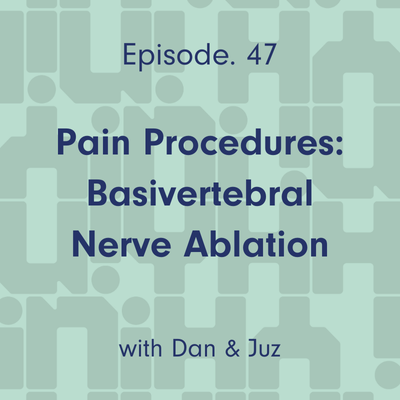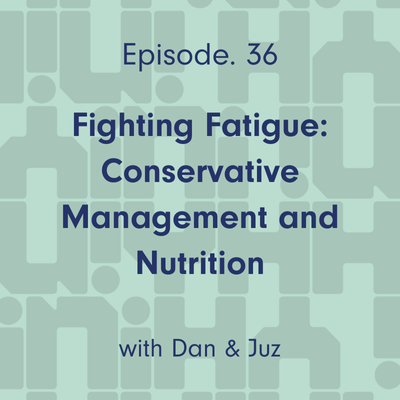Dan is an Interventionist and Sports Physician, Justine is a Pain Coach and patient. We’ve come together to find ways to explain and manage complex pain better for both patients and providers. Welcome to our episodes! You can also subscribe to and watch episodes on our YouTube channel.

Ep. 49 Pain Procedures: Neuromodulation
In this episode, hosts Dr. Dan Bates and Justine Feitelson dive into the fascinating world of neuromodulation, a last step in the treatment algorithm for neuropathic pain.

Ep. 48 Pain Procedures: Sympathetic Injections
In this episode of 'It's Not In Your Head' podcast, cohosts Dr. Dan Bates and Justine Feitelson delve deep into sympathetic injections and how to use them with different pain presentations.

Ep. 47 Pain Procedures: Basivertebral Nerve Ablation
Join Justine Feitelson and Dr. Dan Bates in this episode of 'It's Not In Your Head' as they dive into the specifics of basivertebral nerve ablation (BVNA).

Ep. 46 Strategies to Navigate the Holidays
In this episode of 'It's Not In Your Head' podcast, hosts Justine Feitelson and Dr. Dan Bates discuss challenges faced by chronic pain patients and overwhelmed clinicians during the holiday season.

Ep. 45 Pain Procedures: Epidurals
In this episode of "It's Not In Your Head" podcast, co-hosts Justine Feitelson and Dr. Dan Bates delve into the intricacies of epidurals.

Ep. 44 Pain Procedures: Sacroiliac Joint Radiofrequency
In this episode of 'It's Not In Your Head' podcast, hosts Justine Feitelson and Dr. Dan Bates delve into radiofrequency ablation as a treatment for sacroiliac joint (SIJ) dysfunction.

Ep. 43 Pain Procedures: SIJ Prolotherapy
Join hosts Justine Feitelson and Dr. Dan Bates in this episode of 'It's Not In Your Head' as they dive into the details of prolotherapy, a controversial but effective treatment for sacroiliac joint dysfunction.

Ep. 42 Pain Procedures: Sacroiliac Joint (SIJ) Blocks
In this episode of 'It's Not In Your Head,' co-host Justine Feitelson and Dr. Dan Bates recap the five major causes of lower back pain and dive into performing sacroiliac joint (SIJ) procedures, specifically diagnostic blocks.

Ep. 40 Pain Procedures: Medial Branch Blocks
In this episode of 'It's Not In Your Head,' hosts Justine Feitelson and Dan Bates transition from conservative pain management strategies to discuss advanced interventional techniques aimed at diagnosing and treating lower back pain.

Ep. 41 Pain Procedures: Facet Joint Radiofrequency
In this episode of the It's Not In Your Head podcast, hosts Justine Feitelson and Dr. Dan Bates delve into the intricacies of radio frequency neurotomy as a pain management procedure.

Ep. 39 Mood & Stress Management
In this episode of 'It's Not In Your Head Podcast,' Justine Feitelson and Dr. Dan Bates tackle effective strategies to manage mood and stress for chronic pain sufferers.

Ep. 38 Dysautonomia
Join Dr. Dan Bates and Justine Feitelson in this episode of 'It's Not In Your Head,' where they delve into dysautonomia and its impacts on chronic pain patients.

Ep. 37 Sensory Sensitization - Conservative Management Strategies
Join co-hosts Dr. Dan Bates and Justine Feitelson on 'It's Not In Your Head' as they tackle the complex world of sensory sensitization.

Ep. 36 Fighting Fatigue: Conservative Management and Nutrition
In this episode of It's Not in Your Head, Dan Bates and Justine Feitelson discuss the intricacies of chronic fatigue syndrome and treating excessive fatigue.

Ep. 35 AUA 3
Join Dr. Dan and Justine, a pain coach, on this episode of 'It's Not In Your Head' podcast as they delve into the complexities of managing various aspects of chronic pain, particularly central sensitization, its causes, and various treatment strategies.

Ep. 34 Sacroiliac Joint (SIJ) Dysfunction
Justine and Dan delve deep into the complexities of pelvic dysfunction, focusing specifically on sacroiliac joint (SIJ) instability.

Ep. 33 The Therapeutic Spectrum: Right Treatment, Right Patient
In this insightful episode of 'It's Not In Your Head' podcast, Dan and Justine discuss the concept of managing chronic pain through political analogies—left wing, right wing, and centrist approaches.

Ep. 32 Having Difficult Conversations
In this episode of 'It's Not In Your Head,' Dan and Justine discuss the intricacies of managing chronic pain, highlighting the importance of having difficult conversations between patients, caregivers, and medical providers.

Ep. 31 Chronic Pain: Dealing with Being Overwhelmed
In this episode of 'It's Not In Your Head' podcast, Dan and Justine discuss strategies to manage feelings of overwhelm often experienced by chronic pain patients.

Ep. 30 Making Sense of Hypermobile Ehlers-Danlos Syndrome
In this episode of 'It's Not In Your Head', Dan and Justine delve into the complex relationship between hypermobile Ehlers-Danlos syndrome (hEDS) and central sensitization, focusing on hEDS as an example of a metabolic driver.

